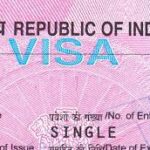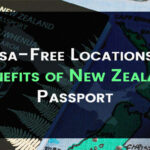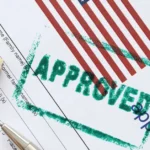Business Visa for US allows individuals to visit the United States for business purposes such as attending conferences, meetings, or negotiating contracts. Visitor Visa for US is a travel document that allows non-US citizens to enter the country temporarily for tourism or leisure activities.
In today’s globalized world, international travel has become more common and accessible. Many individuals, whether for business purposes or leisure, desire to visit the US. However, before embarking on a trip to the US, it is crucial to understand the visa requirements and processes.
This article will provide an overview of the Business Visa for US and Visitor Visa for US, including the application process and necessary documentation. By familiarizing yourself with these requirements, you can streamline your travel plans and ensure a hassle-free journey to the United States.
Types Of Us Visas
For those planning to visit the US for business purposes, a Business Visa is required, allowing entry for specific activities. Meanwhile, a Visitor Visa is suitable for those traveling for tourism or visiting family or friends. Each visa has its own set of requirements and eligibility criteria.
A US visa allows individuals from other countries to enter the United States for various purposes. There are different types of visas available, including visitor visas and business visas.
Visitor Visas
Visitor visas, also known as tourist visas, are intended for individuals who wish to visit the United States temporarily for tourism or pleasure. These types of visas are typically issued for a specific period and may not allow individuals to work or study in the country. Visitors are required to provide evidence of their intent to return to their home country upon the completion of their visit.
Business Visas
Business visas, on the other hand, are designed for individuals who need to travel to the United States for business-related activities. This may include attending meetings, conferences, or negotiating contracts. Business visas often require individuals to provide supporting documentation, such as a letter from the company they are affiliated with, detailing the purpose of their visit.
When applying for a visa, it is crucial to carefully review the requirements and provide all necessary documentation to avoid any delays or rejections. It is recommended to consult with an immigration attorney or seek guidance from the official website of the U.S. Department of State for accurate and up-to-date information.
Visitor Visas Requirements
In order to enter the US for business purposes, you will need to apply for a Business Visa. This type of visa is intended for individuals who plan to conduct business activities such as attending meetings, conferences, or negotiating contracts. To obtain a Business Visa, you will need to provide certain documents and fulfill specific requirements.
When it comes to visitor visas, the purpose of your visit plays a significant role in determining the appropriate visa category. If your main goal is to visit the US for tourism or visit family or friends, then a Visitor Visa would be the right choice. The application process for a Visitor Visa involves submitting the required documents, including a valid passport, proof of financial support, and evidence of ties to your home country.
If you wish to apply for a Business Visa or a Visitor Visa, it is important to carefully review the specific requirements and guidelines provided by the US authorities. By following the correct procedures and submitting the necessary documents, you can increase your chances of obtaining the desired visa and enjoying a successful visit to the US.
Business Visas Eligibility
Business Visas Eligibility: When applying for a business visa to the US, there are different types that investors and employees can explore. The Investor Visas enable foreign investors to establish new businesses or invest in existing enterprises in the US. These visas require a substantial investment and the creation of job opportunities for US citizens or residents. On the other hand, Employment-Based Visas cater to individuals with specific skills and abilities that are in demand in the US job market. These visas typically require sponsorship from a US employer. Each category has its own set of eligibility criteria that applicants need to fulfill to obtain the visa.
Navigating The Application Process
When applying for a business visa for the US or a visitor visa for the US, documentation is a crucial aspect of the application process. It is important to ensure that you have all the necessary documents in order to increase your chances of success.
For a business visa, you will typically need to provide documentation such as a letter of invitation from a US company, proof of your business ties in your home country, and financial documents to show that you can support yourself during your stay.
When applying for a visitor visa, you will need to provide documentation that demonstrates the purpose of your visit, ties to your home country, and your ability to financially support yourself during your stay.
Preparing for your interview is also vital. Make sure to carefully review your application and the documents you are submitting. Familiarize yourself with the interview process and practice answering commonly asked questions. Be confident and honest during the interview. Visitor Visa FOR US
Understanding Visa Restrictions
US visas have certain work limitations that applicants must be aware of. The type of visa you hold determines the duration of your stay and your ability to work. Business visas in the US, such as the B1 visa, allow non-immigrants to engage in activities related to their business interests, like attending meetings or conferences. However, work for a US-based employer is strictly prohibited. Foreign nationals in possession of a visitor visa, such as the B2 visa, are permitted to stay in the US for a specific duration, usually six months, to enjoy tourism and other leisure activities. It is essential to note that both categories of visas restrict any form of illegal employment in the country. Violation of these work limitations may result in the revocation of your visa and potential deportation.
| Business Visa (B1) | Visitor Visa (B2) |
| Allowed for business activities | Leisure tourism activities |
| No work for a US employer | No work for a US employer |
| Duration depends on specific requirements | Usually up to six months |
Frequently Asked Questions
Can I Apply For A Business Visa For The Us?
Yes, you can apply for a business visa for the US if you are planning to conduct business-related activities such as attending meetings, participating in conferences, or negotiating contracts. This visa allows you to stay in the US for a specific period of time to carry out your business activities.
What Is The Process To Apply For A Business Visa?
To apply for a business visa for the US, you need to complete the online application form, pay the required fee, and schedule an interview at the US embassy or consulate in your country. During the interview, you will be asked about the purpose of your trip, supporting documents will be reviewed, and your eligibility will be determined.
Can I Visit The Us On A Visitor Visa?
Yes, you can visit the US on a visitor visa if your purpose is to travel for tourism, attend a conference or seminar, visit family or friends, or undergo medical treatment. However, it is important to note that a visitor visa does not allow you to engage in any business activities or work in the US.
How Long Can I Stay In The Us On A Visitor Visa?
The duration of stay in the US on a visitor visa varies depending on the type of visa issued to you. Generally, you are allowed to stay for a period of up to 6 months. It is important to adhere to the specified duration and not overstay your visa, as it may lead to future visa complications.
Conclusion
Obtaining a business visa is crucial for conducting professional activities in the US, while a visitor visa allows for short-term visits. Understanding the nuances between these two visa types is essential for ensuring a smooth and successful entry into the country.
Consult with immigration experts for personalized guidance.
I am an accomplished tech writer with a passion for simplifying complex technology concepts. With a background in Tech, James has dedicated their career to making the intricacies of the digital world accessible to a broad audience.








